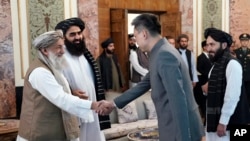China’s recent decision to accept the credentials of the Taliban ambassador to Beijing, without having formally recognized Afghanistan’s new rulers as the legitimate government, is both paradoxical and transactional, experts say.
The Taliban foreign ministry announced December 1 that the director-general of the protocol department of the Chinese Foreign Ministry, Hong Lei, had accepted the credentials from Taliban Ambassador Asadullah Bilal Karimi.
The following week, the Chinese Ministry of Foreign Affairs’ spokesperson, Wang Wenbin, said, “Afghanistan should not be excluded from the international community.”
But he reiterated long-standing demands that, in order to gain formal recognition, the Taliban must form an inclusive government, pursue “moderate and prudent” policies and show a firm commitment to combat terrorism.
"We believe that diplomatic recognition of the Afghan government will come naturally as the concerns of various parties are effectively addressed,” Wang said during a regular press briefing.
Vanda Felbab-Brown, a senior fellow at the Washington-based Brookings Institution, said China “is trying to have it both ways.”
No country has yet recognized the Taliban as the legitimate government of Afghanistan since the group seized power in August 2021. However, some countries, including China, have kept their embassies open in Afghanistan and have accredited Taliban diplomats.
In September, China became the first country to send a new ambassador to Afghanistan since the Taliban’s takeover.
China is now the first country to accept the Taliban’s ambassador.
“Accepting the Taliban’s ambassador is what normally is considered as recognition,” said Felbab-Brown. “China doesn't want to break and be ahead of the international community, and the U.N. has made it explicit that the Taliban will not get the seat in the U.N. unless it stops repressing women in the way we have seen.”
In November, an assessment commissioned by the United Nations linked recognition of the Taliban government to compliance with Afghanistan’s international treaty obligations and commitments, including removing the ban on women’s education and work.
Afghanistan is signatory to a number of international treaties that guarantee human rights for women and girls, including the Convention on the Elimination of All Forms of Discrimination Against Women (CEDAW) and International Covenant on Economic, Social and Cultural Rights (ICESCR).
Felbab-Brown said China “can put pressure” on the Taliban to comply with international demands to form an inclusive government and respect women’s rights, but “they are not willing to do so.”
The pressing issue for China is the presence of the Eastern Turkistan Islamic Movement, or ETIM, in Afghanistan.
China considers the ETIM, which was founded by a Uyghur religious figure, Hasan Mahsum, in 1997 in Pakistan, as a threat to its security. Mahsum was killed by Pakistani troops 20 years ago.
China blames the shadowy organization for attacks inside its territory and uses it to justify its crackdown on Uyghurs in the Western region of Xinjiang. The U.S. placed ETIM on its list of terrorist groups in 2002, after the September 11 attacks. The group’s terrorist designation was removed in 2020.
Chinese officials said the Taliban agreed to not allow ETIM fighters to “engage in terrorist activities.”
But China will be asking for more actions against the ETIM, said Felbab-Brown. “I would be very surprised if China gave away that card without getting the Taliban to do more on the Uyghur militancy.”
Transactional relations
Bill Roggio, a senior fellow at the Foundation for Defense of Democracies, told VOA that the Taliban “continue to maintain” close ties with militant groups, including the ETIM.
He added that Beijing’s main concern is that the ETIM “will be reinvigorated and plot more attacks against China from within Afghanistan.”
The Taliban pledged in May not to allow the ETIM to conduct attacks against China, according to the Chinese state newspaper Global Times. Beijing sent its first envoy to Kabul under the Taliban government four months later.
It is "transactional," said Roggio, adding that “that is the heart of the relationship” between China and the Taliban.
In addition to addressing security concerns, “Chinese like to open businesses, mine and export goods into Afghanistan, and the Taliban want diplomatic relations ... that gives them a degree of legitimacy,” said Roggio.
Regional rivalry
China’s ties with the Taliban could spark a regional rivalry, said Shinkai Karokhil, a former Afghan diplomat and member of the Wolesi Jirga, the lower house of Afghanistan’s parliament.
“Russia might be the next [to normalize relations with the Taliban], since it considers Afghanistan as part of its influence,” said Karokhil.
Karokhil said countries in the region including Pakistan and India would also be "concerned" about China-Taliban ties.
India does “not want to fall behind” China is gaining influence in Afghanistan, said Ashok Swain, a professor of peace and conflict research at Uppsala University in Sweden.
He said India would “possibly find some ways of reestablishing contacts with Afghanistan.”
After the announcement of the closure of the Afghan Embassy in Delhi by the former Afghan government diplomats last month, a high-ranking Taliban official said the embassy would reopen soon under the Taliban’s control.
India has kept its embassy in Afghanistan open.
Sami Yousufzai, a London-based Afghan journalist, told VOA that China is a "major" power, and “it looks like other countries would also improve their relations with the Taliban.”
Zheela Noori and Nazrana Ghaffar Yousufzai of VOA's Afghan Service contributed to this report, which originated in VOA's Afghan Service.








